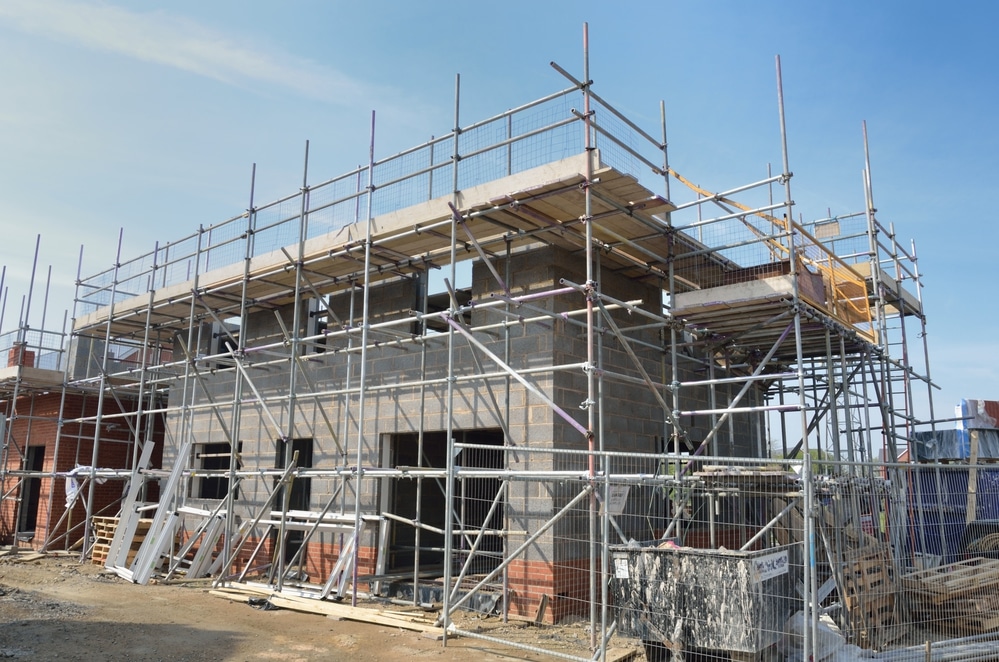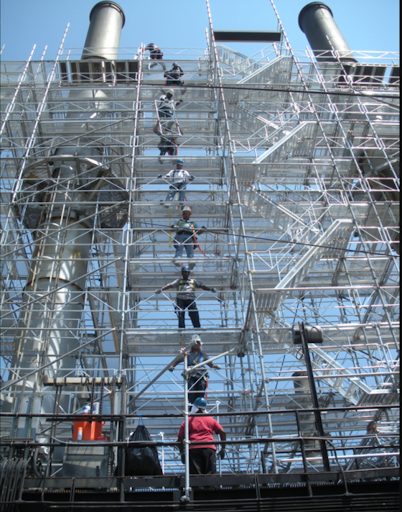Get the Best Scaffolding Cobham Services for Your Building Projects
Get the Best Scaffolding Cobham Services for Your Building Projects
Blog Article
Exploring the Various Sorts Of Scaffolding Made Use Of in Construction Tasks
The building and construction industry depends greatly on various types of scaffolding to satisfy specific task demands, each offering distinctive advantages and applications. Traditional structure scaffolding supplies a sturdy foundation for general tasks, while suspended scaffolding is necessary for job on skyscraper frameworks.

Standard Framework Scaffolding
Traditional structure scaffolding is just one of the most commonly utilized techniques in the construction sector because of its robustness and adaptability. This system contains upright and horizontal frameworks that are put together to develop a stable platform for materials and employees. The main elements consist of upright articles, straight ledgers, and angled dental braces, which together supply a solid structure that can sustain significant loads.
One of the essential benefits of typical framework scaffolding is its versatility to numerous building and construction jobs, varying from household buildings to large industrial structures. The modular style enables very easy setting up and disassembly, making it reliable for both temporary and lasting tasks. In addition, the system can be tailored in elevation and size, suiting various structure layouts and website problems.
Safety and security is extremely important in scaffolding applications, and traditional frame systems are equipped with guardrails and toe boards to avoid falls and ensure worker protection. Regular examinations and adherence to safety and security guidelines are vital in preserving the integrity of the scaffold (Scaffolding). Overall, traditional structure scaffolding stays an essential choice in the building and construction sector, providing a dependable system for labor and boosting total project efficiency

Suspended Scaffolding
Put on hold scaffolding provides an one-of-a-kind service for building and construction projects that call for accessibility to elevated surfaces, particularly in circumstances where traditional framework scaffolding might be impractical. This sort of scaffolding is typically put on hold from the roof or upper degrees of a framework, utilizing a system of wheels, platforms, and ropes to develop a working space that can be changed to numerous elevations.
Among the primary advantages of suspended scaffolding is its versatility. It can be quickly rearranged or reduced to accommodate modifications in building requirements, making it excellent for tasks such as window installation, façade work, and maintenance on skyscrapers. Furthermore, the very little impact of suspended scaffolding enables much better use ground space in urban environments, where space is commonly restricted.
Security is an important factor to consider in the use of suspended scaffolding. On the whole, put on hold scaffolding offers a efficient and efficient remedy for accessing hard-to-reach areas in various building and construction situations, enhancing both efficiency and safety on website.
System Scaffolding
System scaffolding, typically concerned as a modern-day option in the scaffolding industry, scaffolder salary is composed of pre-engineered components that can be swiftly constructed and adapted for various building jobs. Scaffolding. This kind of scaffolding is identified by its modular design, which enables versatility and performance on job websites, accommodating various elevations and structural needs
Typically made from high-strength steel or light weight aluminum, system scaffolding offers improved durability and stability. The parts include vertical blog posts, horizontal ledgers, and angled dental braces, which interconnect safely, ensuring a robust framework. The style often integrates standard installations, simplifying assembly and disassembly processes, consequently decreasing labor time and costs.

Rolling Scaffolding
Rolling scaffolding is a functional alternative to typical set scaffolding, developed for mobility and simplicity of use on construction websites. This type of scaffolding is composed of a platform sustained by frameworks with wheels, allowing employees to easily transfer it as needed. The wheelchair feature significantly improves productivity, as it lessens downtime connected with dismantling and putting together fixed scaffolding.
Commonly built from lightweight materials such as light weight aluminum or steel, rolling scaffolding provides a strong yet mobile service for tasks requiring regular repositioning - Scaffolding. It is specifically beneficial in jobs such as paint, drywall installation, and electrical job, where accessibility to various elevations and areas is necessary
Security is extremely important in rolling scaffolding design, with functions such as securing wheels to avoid unexpected activity when being used, and guardrails to safeguard employees from drops. In addition, lots of versions are flexible in elevation, suiting numerous task demands.
Cantilever Scaffolding

The design scaffolder fined of cantilever scaffolding generally entails utilizing braces or arms secured to a building or framework, allowing the system to prolong outward safely. Safety and security is vital; thus, these scaffolds need to be engineered to stand up to environmental problems and numerous tons. Normal evaluation and upkeep are important to make certain structural stability and employee safety.
Cantilever scaffolding is preferred for its versatility and efficient use of space, making it a preferred selection in urban environments where area restraints are typical. It promotes easier access to high altitudes, inevitably adding to the total efficiency of building jobs. Just like all scaffolding kinds, correct training and adherence to safety and security standards are essential for workers using cantilever scaffolding.
Final Thought
Traditional structure scaffolding gives security, while suspended scaffolding uses versatility for elevated jobs. System scaffolding promotes quick assembly, and rolling scaffolding boosts wheelchair for varying job settings.
Conventional frame scaffolding gives a strong blog foundation for basic tasks, while put on hold scaffolding is vital for work on skyscraper structures.Moving scaffolding is a versatile choice to standard fixed scaffolding, created for movement and convenience of use on building and construction sites. As with all scaffolding types, proper training and adherence to security standards are important for employees utilizing cantilever scaffolding.
Conventional structure scaffolding supplies security, while suspended scaffolding uses flexibility for raised tasks. System scaffolding helps with fast assembly, and rolling scaffolding improves mobility for varying job environments.
Report this page